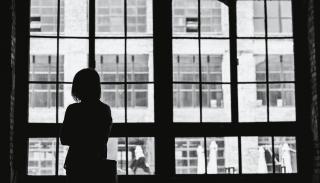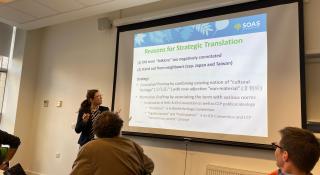
Breadcrumbs navigation
The in-between
Sofia Doyle and Dr Jana Fey write the fourth blog in the 'Gender, Race, and the Intersections of Precarity' series. They discuss how difficult the COVID-19 lockdowns were for those on casualised work contracts in higher education, and what this revealed about the precarious nature of work in academia. Continuing the work flowing from our 2021 BISA and PSA report 'Career trajectories in UK departments of Politics and International Relations', Dr Skyler Hawkins (Newcastle University) coordinated this series to give real faces and experiences to the key statistical findings.
There are different layers of precarity, casualisation, and insecurity in the British Higher Education labour market. At its core, the detrimental impact of casualisation affects colleagues across all levels (even those in permanent positions) as well as the students with whom staff share a teaching and learning environment. As early career-researchers, we feel that the spaces of in-between which are created through these insecure conditions have and continue to play a significant role in our lives. They define how we navigate/d our PhDs during the pandemic, our relationship with the institutions we work in, and ultimately how we understand ourselves as researching and belonging to international politics. More than anything, uncertainty sometimes seeps into our lives in unexpected ways. We come up with 'sticking plasters' to bridge the gaps and we create new spaces in which to share and support one another.
One such respite, we found in each other when we met in a now distant seeming pre-pandemic autumn, our desks next to each other. That side of the desk cluster was seldom quiet, itself located in an open-plan space between the communal kitchen and one of the main entrances of the floor (read: hallway). We shared some of our first experiences of academic research and teaching located in a literal space of being in-between. What follows is a brief series of reflections on uncertainty, lockdowns, and vulnerability.
Work from home unless you are unable to do so
The second UK-wide lockdown was a long, cold, and lonely winter I spent desperately trying to manage writing my thesis and teaching undergraduates online. With no desk nor money for it for most of the term, I taught sat on my bedroom floor, angling the camera so my students wouldn’t see what kind of environment their teacher was in. That there was barely enough room to sit. That my back had started to hurt so much that I winced every time I moved. That my radiator had leaked all over the floor. I’d feign a smile and ask them how they were doing. Once, I moved my students into breakout groups, turned my camera and mic off, and cried.
Wellbeing champions
When my students were struggling with lockdown they came to me, emails rushing through my inbox. They approach us because we are one of their key sources of contact, and indeed women are more likely to be seen as approachable sources of support. But we’re told we have to pass them on, that we aren’t the place for them to go, that we can’t give help or advice. I knew the counselling services were overrun and underfunded because my friends and colleagues couldn’t get seen either. I desperately contacted student wellbeing teams time and time again, knowing there was no money at the university to give them the help they needed. The money goes elsewhere. I felt powerless. My students were sinking and I was too.
Succulents to make your life suck less
Given the decline of mental health among staff and students in HE, universities introduce ever more programmes and workshops to combat mental distress. What wellbeing intervention have they come up with now? I open my emails: A free cactus for every PGR! If you come down to the reception by 3pm, you can pick up a free cactus for your desk. Plants help with your mental health. Pick up a cactus! It's too bad really that most desks in the building do not have any natural light. What really grinds, though, is that collaborative efforts to improve working conditions (Pay on time! Actual contracts! Sick Pay!) for teaching assistants and postgraduate researchers are met with such callousness. It reminds me of that ambiguous boundary between staff and student during the PhD, often not fully one or the other, but certainly always whatever role the institution chooses to recognise when questioned. Still, this succulent feels political. A tiny thorny symbol of resistance.
Innovative online research methods
During the same lockdown, I was conducting fieldwork on staff-to-student sexual violence in UK HE. When I’m conducting fieldwork I’m no longer a member of staff but a student. A student conducting interviews on the topic of sexual violence out of my home because there was nowhere else. Pointing my camera to the window so it didn’t appear this was my own personal space. Some days I’d gaze around the room after an interview. How curious that my home was the site in which I was conducting fieldwork on sexual violence, when our homes are so often the rooms in which sexual violence occurs. I live in a shared rental house that will have been home to many different people in its history. I wondered if my house had a history of sexual violence. I felt sick. I went on a walk for my mental health, as HE institutions advised at this time as part of their well-being advice. Of course, when I came back, nothing had changed.
The last two years felt heavy for many working in academia, but the burden of those on casualised contracts, especially postgraduate researchers and teaching assistants, has been crushing. We have sought shelter in informal support networks and pulled each other through these times. We now advocate for more sustained changes to HE. It has therefore become ever more important to work towards a formal space of transformative action. We hope that the ‘Gender, race and the intersections of precarity’ workshop at the BISA annual conference next week (15 to 17 June 2022) can be the start of such an initiative. Please consider attending by registering through the link below.
Photo by Alex Ivashenko on Unsplash


